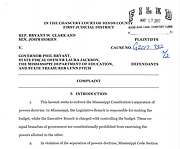Former Gov. Ronnie Musgrove argued that the Legislature must fully fund the Mississippi Adequate Education Program, based on language set out in the state's constitution; lawyers for the state argued just the opposite. Photo by Arielle Dreher.
JACKSON — The fight to fully fund the state's education funding formula had its day in the Mississippi Supreme Court on Wednesday. Former Gov. Ronnie Musgrove told the court that the Mississippi Adequate Education Program must be fully funded in order to follow state law as it is written.
Musgrove argued that Section 201 of Mississippi's Constitution requires the Legislature to fully fund MAEP. Section 201 says, "The Legislature shall, by general law, provide for the establishment, maintenance and support of free public schools upon such conditions and limitations as the legislature may prescribe."
Musgrove, who is representing several school districts in the state, told the court that the word "shall" creates a mandate for the Legislature to fully fund the schools.
"It is a mandate because in Pascagoula School District, this court said it was a mandate ... it is a mandate to establish, maintain and support a system of free and public schools," Musgrove argued.
Justice Jess Dickinson asked Musgrove what he wanted the court to do if Musgrove won his case. "You're suggesting we go down the path of becoming the appropriator that we order the funds to be paid and skip over the Legislature?" Dickinson asked.
"Your honor, it would be the same situation in any event that the Legislature failed to abide by a constitutionally mandated obligation," Musgrove said. "Again, there is no excuse for failing to appropriate for the judiciary or the district attorneys—those are all constitutionally mandated statutes."
The state, represented by Justin Matheny, argued Section 201 of the state's constitution is not a forcible mandate for the Legislature to appropriate specific amounts of money to school districts in the future. "One Legislature, specifically in this case the 2006 Legislature, cannot control what future Legislatures must appropriate to school districts," Matheny told the court.
Justice Dickinson asked Matheny about Musgrove's comparison of the Legislature funding education to the Legislature funding judges and prosecutors in the state.
"Suppose the Legislature decided we're not going to include any money to pay for judges, prosecutors or prosecutors, so we're faced then by a lawsuit ... (and they) say we're entitled to be paid by statute and the Legislature refused to appropriate any money to pay—what do you think our position should be?" Dickinson asked.
Matheny said there is a distinction between what the Legislature can do to inhibit future Legislatures and cannot do.
"When it comes to authorizing contractual powers such as salaries, contract matters, when state agencies are authorized to issue bonds, it creates a contract right for somebody. So if in the future if the Legislature didn't pay or appropriate the money..., then you have a contract right to go into court to enforce that," Matheny argued. "... But this is totally different, this is the 2006 Legislature purporting to speak directly to future Legislatures and telling them they only have one option."
Musgrove told reporters after an hour of arguments that even if the Legislature changed the funding formula, which is within its discretion, lawmakers would still have to fully fund it. That conclusion, he said, is based on how he reads Section 201.
"The whole idea that you would pass a funding formula that complied with Section 201 of the Constitution and then put a paragraph in that says we can fund it at whatever level we choose, that's not complying with the Constitution," Musgrove told reporters.
On the same day Musgrove made arguments before the Mississippi Supreme Court, Rep. Bryant Clark, D-Pickens, and Sen. John Horhn, D-Jackson, filed a lawsuit in Hinds Chancery Court arguing that Gov. Phil Bryant's mid-year budget cuts to the Mississippi Adequate Education Program violate the separation of powers doctrine.
Email state reporter at arielle@jacksonfreepress.com and follow her on Twitter at @arielle_amara.





Comments
Use the comment form below to begin a discussion about this content.